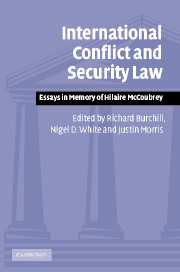Book contents
- Frontmatter
- Contents
- Biography of Hilaire McCoubrey
- Notes on contributors
- Foreword: There are men too gentle to live among wolves
- List of abbreviations
- 1 Hilaire McCoubrey and international conflict and security law
- 2 The development of operational law within Army Legal Services
- 3 Reflections on the relationship between the duty to educate in humanitarian law and the absence of a defence of mistake of law in the Rome Statute of the International Criminal Court
- 4 Superior orders and the International Criminal Court
- 5 Command responsibility: victors' justice or just desserts?
- 6 The proposed new neutral protective emblem: a long-term solution to a long-standing problem
- 7 Towards the unification of international humanitarian law?
- 8 Of vanishing points and paradoxes: terrorism and international humanitarian law
- 9 What is a legitimate military target?
- 10 The application of the European Convention on Human Rights during an international armed conflict
- 11 Regional organizations and the promotion and protection of democracy as a contribution to international peace and security
- 12 Self-defence, Security Council authority and Iraq
- 13 International law and the suppression of maritime violence
- 14 Law, power and force in an unbalanced world
- Bibliography of Hilaire McCoubrey's work
- Index
8 - Of vanishing points and paradoxes: terrorism and international humanitarian law
Published online by Cambridge University Press: 17 July 2009
- Frontmatter
- Contents
- Biography of Hilaire McCoubrey
- Notes on contributors
- Foreword: There are men too gentle to live among wolves
- List of abbreviations
- 1 Hilaire McCoubrey and international conflict and security law
- 2 The development of operational law within Army Legal Services
- 3 Reflections on the relationship between the duty to educate in humanitarian law and the absence of a defence of mistake of law in the Rome Statute of the International Criminal Court
- 4 Superior orders and the International Criminal Court
- 5 Command responsibility: victors' justice or just desserts?
- 6 The proposed new neutral protective emblem: a long-term solution to a long-standing problem
- 7 Towards the unification of international humanitarian law?
- 8 Of vanishing points and paradoxes: terrorism and international humanitarian law
- 9 What is a legitimate military target?
- 10 The application of the European Convention on Human Rights during an international armed conflict
- 11 Regional organizations and the promotion and protection of democracy as a contribution to international peace and security
- 12 Self-defence, Security Council authority and Iraq
- 13 International law and the suppression of maritime violence
- 14 Law, power and force in an unbalanced world
- Bibliography of Hilaire McCoubrey's work
- Index
Summary
Introduction
Humanitarian law only applies in cases of armed conflict and, historically, this was limited to conflicts between states. However, as a response to increased instances of internal conflict, this evolved to include non-international conflict between states and insurgent or belligerent groups. To this extent there has been an increased scope for the application of humanitarian law, and it must be conceded that humanitarian law may usefully control or mitigate violence involving non-state actors. Other legal regimes such as domestic and international criminal law and human rights law also apply to a limited extent during times of armed conflict, and more fully when international violence falls short of armed conflict. However, international violence in the form of terrorism is an increasing threat to contemporary international security, as incidents such as the bombing of the American embassies in Kenya and Tanzania in 1998, the strike against the USS Cole in October 2000, the attacks of 11 September 2001, the bombing of the British Consulate in Istanbul in 2003 and railway bombs in Madrid in March 2004 confirm. These incidents involve acts of violence by transnational armed groups and have led to calls for action by the victim states against the perpetrators: a so-called ‘war on terror’. In such a war it is right to ask can, and should, international humanitarian law exert any controlling effect on the violence.
- Type
- Chapter
- Information
- International Conflict and Security LawEssays in Memory of Hilaire McCoubrey, pp. 129 - 159Publisher: Cambridge University PressPrint publication year: 2005



